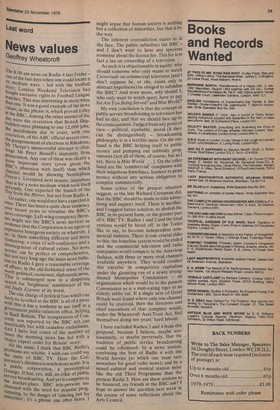L ast word
News values
Geoffrey Wheatcroft
The 8.00 am news on Radio 4 last Friday — one of the last days when one could locate it On medium wave — led with the football .story: London Weekend Television had bought exclusive rights to Football League rnatches. This was interesting in more ways than one. It was a good example of the news values, as the phrase is, which prevail today at the BBC. Among the other stories of the flaY Were the revelation that British ShipDnilders were planning to axe 12,000 jobs; the Penultimate day in court, with one conviction, of the ABC official secrets case; the postponement of elections in Rhodesia; NI r Thorpe's unsuccessful attempt to chal lengeI enge Mr Peter Bessell's immunity from Prosecution. Any one of these was clearly a iriZe important story (even given the '33C's obsession with itself) than which Channel would be showing Nottingham "rest v. Liverpool next season; important that is for a news medium which took itself !seriously. One expected the Snatch of the 1-JaY from the Mirror, but not from Radio 4. Or rather, one would not have expected it once. There has been a quite clear tendency over recent years to trivialise the BBC's news coverage. Left-wing conspiracy theorists might see the BBC's news services as evidence that the Corporation is an agent of repressive bourgeois society or whatever. I Se,.: in them something different and more Tsmaying: a crisis of self-confidence and a uisintegration of cultural values. No news ,service can be perfect or comprehensive, but not very long ago the main news bulletins on Radio 4 gave a reasonable coverage Of affairs, in the old-fashioned sense of the word: political, economic, diplomatic news. That is submerged now in a desperate search for 'brightness' reminiscent of the old Daily Express at its worst. The one charge of political bias which can fairly be levelled at the BBC is all of a piece With this: it has a tendency to see itself as a government public relations office, helping to Back Britain. The inauguration of Concorde was reported by the BBC not just Uncritically Andbut with ceaseless enthusiasm. have lost count of the number of !lilies the morning news has led with a Major export order for Britain' story. All the same, I think that BBC Radio's Problems are soluble. I wish one could say the same of BBC TV. Here the CorPoration's dilemma is much more acute. It is a public corporation, a prototypical Quango. It has, yes, still, an ethic of public service broadcasting. And yet it comPetes in the market-place. BBC tele-persons are Obsessed with the need for popular Programming, by the danger of 'catering just for minorities': it's a phrase one often hearsI might argue that human society is nothing but a collection of minorities, but that is by the way. The inherent contradiction stares us in the face. The public subsidises the BBC — and I don't want to hear any specious nonsense about the licence fee. This fee is in fact a tax on ownership of a television. As such it is objectionable in equity: why should someone who only wants to watch Crossroads on commercial television (and I don't suppose he, or she, exists only in abstract hypothesis) be obliged to subsidise the BBC? And even more, why should I, who only want to watch sport, have to PO forA re You Being Served? and Miss World? My own conclusion is that the concept of public service broadcasting in television has had its day, and that we should face up to the consequences. Judged from any point of view — political, equitable, moral (if they can be distinguished) — broadcasting philosophy is in a terrible mess. On the one hand is the BBC helping itself to public money and pumping out rubbishy programmes (not all of them, of course, but as I say, there is Miss World. . .). On the other hand are the 'commercial' companies with their iniquitous franchises, licences to print money without any serious obligation to compete commercially. Some critics of the present situation suggest, as the late Richard Crossman did, that the BBC should be made to take advertising and support itself. There is another, and I suggest better solution: to abolish the BBC in its present form, or the greater part of it. BBC TV, Radios 1 and 2 and the local stations would be hived off, as the Tories like to say, to become independent commercial stations. There is one crucial rider to this: the franchise system would be ended and the commercial television and radio companies would compete in the American fashion, with three or more rival channels available anywhere. They would conduct this excerise in competitive capitalism under the gleaming eye of a newly strengthened Monopolies Commission — an organisation which would be to the present Commission as is a man-eating tiger to an elderly tabby cat. If a single acre of Great Britain were found where only one channel could be received, then the directors and chief executives of that company would, under the Wheatcroft Anti-Trust Act, find themselves doing ten years' hard labour.
I have excluded Radios 3 and 4 from this proposal, because I believe, maybe sentimentally, or maybe perversely, that the tradition of public service broadcasting could be ccintinued: by a news station, combining the best of Radio 4 with the World Service (to which one must turn nowadays for good radio news); and by a mixed cultural and musical station more like the old Third Programme than the present Radio 3. How are these stations to be financed, my friends at the BBC ask? I hope to answer the question next week in the course of some reflections about the Arts Council.


































 Previous page
Previous page